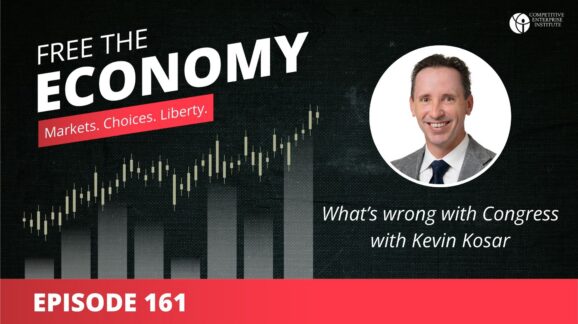There are two main areas in which Congress can enact meaningful reform. The first is to rein in regulatory guidance documents, which we refer to as “regulatory dark matter,” whereby agencies regulate through Federal Register notices, guidance documents, and other means outside standard rulemaking procedure. The second is to enact a series of reforms to increase agency transparency and accountability of all regulation and guidance. These include annual regulatory report cards for rulemaking agencies and regulatory cost estimates from the Office of Management and Budget for more than just a small subset of rules.
In 2019, President Trump signed two executive orders aimed at stopping the practice of agencies using guidance documents to effectively implement policy without going through the legally required notice and comment process.
Featured Posts

Blog
Free the Economy podcast: What’s wrong with Congress with Kevin Kosar
In this week’s episode we talk about we talk about Consumer-Regulated Electricity, the amazing falling US poverty rate, and how smart…

Blog
Trump’s deregulation meets invisible rulemaking: The real 2026 challenge
After a brief shutdown, most fiscal year 2026 appropriations have been enacted, despite continued debate over Department of Homeland Security (DHS) funding. We may soon…

Blog
The week in regulations: Beet food coloring and crab housekeeping
Culture warriors got upset over the Super Bowl halftime show. A mini-shutdown over ICE funding delayed some labor market indicators. Agencies issued new regulations ranging…
Search Posts
Blog
The week in regulations: CAFE standards and Christmas tree promotions
Israel launched a military strike against Iran. US Senator Alex Padilla was detained for trying to ask a question at a Department of Homeland Security…
Blog
Congress should deregulate if it will not tackle entitlement spending
The Senate is currently reviewing the House version of the One Big Beautiful Bill in an effort to have President Trump sign the bill into…
Blog
Your family’s share of federal red tape last year was…
Most people can see taxes on their pay stubs, but there’s another sort of tax that’s much less visible: the cost of government regulations. These…
Blog
The week in regulations: Paper packaging promotion and bridge conditions
President Trump ordered National Guard troops to deploy against American citizens. Agencies issued new regulations ranging from hot air balloons to authorizing ski areas. On…
Blog
The total cost of federal red tape last year was…
$2.15 trillion is CEI’s latest estimate of the costs of all federal regulations. It is an intentionally conservative estimate. Think of it as a floor,…
Blog
DOGE after Musk: From meme to momentum
Elon Musk’s short but headline-grabbing stint with the Department of Government Efficiency (DOGE) has concluded, but the broader deregulatory agenda remains robust and far from…
Staff & Scholars

Clyde Wayne Crews
Fred L. Smith Fellow in Regulatory Studies
- Business and Government
- Consumer Freedom
- Deregulation

Ryan Young
Senior Economist and Director of Publications
- Antitrust
- Business and Government
- Regulatory Reform

Fred L. Smith, Jr.
Founder; Chairman Emeritus
- Automobiles and Roads
- Aviation
- Business and Government

Sam Kazman
Counsel Emeritus
- Antitrust
- Automobiles and Roads
- Banking and Finance

Marlo Lewis, Jr.
Senior Fellow
- Climate
- Energy
- Energy and Environment